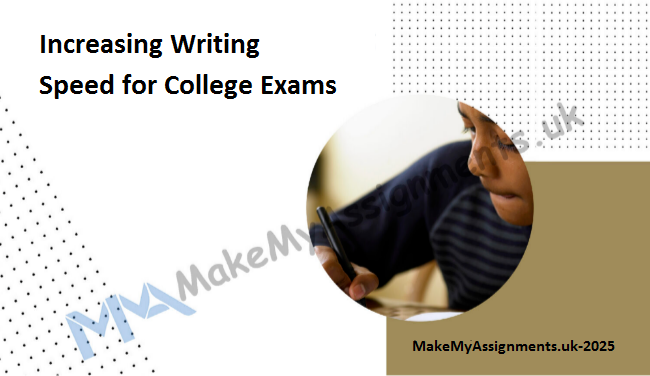Let’s be honest—studying for long hours is hard. With so many distractions around us (hello,…

Increasing Writing Speed for College Exams
College exams often demand a combination of critical thinking and efficient writing. However, even if you know all the answers, slow writing can prevent you from finishing on time, leaving you frustrated. Improving your writing speed for exams isn’t about rushing; it’s about writing effectively and efficiently. Here are some practical tips to help you improve your writing speed without compromising on quality.

1. Practice Writing Regularly
One of the simplest yet most effective ways to increase your writing speed is regular practice. Dedicate time every day to writing, whether it’s summarizing notes, solving past exam questions, or writing essays. Over time, your brain and hand will get used to the pace required during exams. Remember, practice makes perfect—or, in this case, faster!
2. Plan Before You Write
Many students make the mistake of diving straight into writing without a clear plan. This often leads to frequent pauses as you figure out what to say next. Spend a minute or two outlining your answer before starting. A quick plan helps you stay focused, avoid repetition, and reduce the time spent thinking mid-sentence.
3. Work on Your Handwriting
Messy or illegible handwriting can slow you down. If you find yourself erasing or rewriting because you can’t read what you wrote, it’s time to work on improving your handwriting. Practicing clean, consistent letter formation can make a huge difference. Also, experiment with different pens to find one that feels comfortable and allows for smooth, quick writing.
4. Time Yourself
Simulating exam conditions is a great way to improve your speed. Set a timer and try to complete past papers or practice essays within the allotted time. By timing yourself, you can identify where you tend to slow down and work on those specific areas.
5. Learn Shortcut Techniques
In subjects that involve long answers, such as humanities or social sciences, learn how to write concisely. Use bullet points or headings wherever possible, and focus on delivering the core content instead of unnecessarily elaborating. This saves both time and effort.
6. Avoid Overthinking
Overthinking is a common problem during exams. Students often worry too much about making their answers perfect, which consumes precious time. Aim for clarity and correctness, but don’t obsess over every single word. Your goal should be to write well enough to get your point across and earn the marks.
7. Improve Your Typing Speed (for Online Exams)
For students taking online exams, typing speed becomes critical. Use typing practice tools to improve your speed and accuracy. Familiarize yourself with the layout of your keyboard and learn to type without looking at the keys.
8. Take Care of Your Physical Health
Finally, don’t underestimate the importance of physical health. Weak or fatigued hands can slow you down. Stretch your hands regularly, maintain good posture while writing, and eat a balanced diet to keep your energy levels up.
MakeMyAssignments can play a pivotal role in helping students increase their writing speed and efficiency. Their expert writers can provide personalized tips and strategies for improving writing skills. Through feedback on written assignments, they identify areas where students can streamline their writing processes, avoid unnecessary elaboration, and structure their thoughts more effectively. Additionally, MakeMyAssignments offers valuable guidance on time management during exams, ensuring students know how to allocate their time wisely. By practicing with the support of these expert tips, students can significantly boost both their writing speed and overall academic performance.




This Post Has 0 Comments